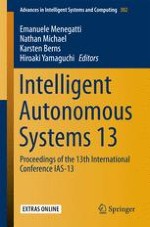2016 | OriginalPaper | Chapter
Bio-inspired Classification in the Architecture of Situated Agents
Authors : G. Gini, A. M. Franchi, F. Ferrini, F. Gallo, F. Mutti, R. Manzotti
Published in: Intelligent Autonomous Systems 13
Publisher: Springer International Publishing
Activate our intelligent search to find suitable subject content or patents.
Select sections of text to find matching patents with Artificial Intelligence. powered by
Select sections of text to find additional relevant content using AI-assisted search. powered by
